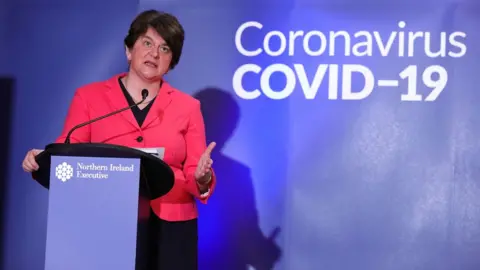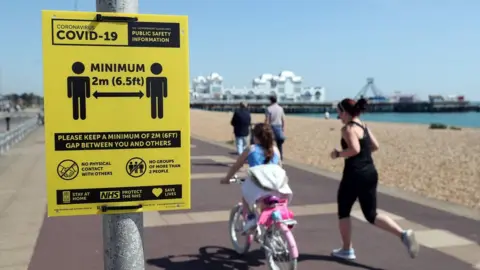Coronavirus: NI lockdown could lift at different pace, suggests Arlene Foster
 PA Media
PA MediaNorthern Ireland may emerge from coronavirus restrictions at a different pace than other parts of the UK, First Minister Arlene Foster has said.
She said measures will be eased when scientific and public health criteria are met, not timetables or dates.
That criteria "will be set down and agreed" by the NI executive as well as UK colleagues, she told Cool FM.
This could mean "different parts of the UK move in different time" to other areas.
Mrs Foster also ruled out introducing a distance restriction, like the 2km limit in the Republic of Ireland, to ensure people exercised locally.
SDLP leader Colum Eastwood had called for Northern Ireland to follow the Republic in introducing a travel limit.
However, the first minister did say the executive is set to provide more clarity over whether people should be able to travel to exercise.
Lockdown lift 'will be criteria-led'
The UK government has said that five tests must be met before restrictions can be eased, including a falling death rate and a decreased rate of infection.
There have been 250 Covid-19 related deaths in Northern Ireland to date.
The total number of deaths across the UK is 18,100, with the chief medical adviser warning that some disruptive social measures are likely to continue for the rest of the year.
When asked by Cool FM if Northern Ireland could move away from restrictions at a different pace from the worst-hit areas of the UK, Mrs Foster responded that the criteria for easing the lockdown will be "set down and agreed by ourselves in the NI Executive in conjunction with the our colleagues in the other parts of the UK".

- A SIMPLE GUIDE: How do I protect myself?
- AVOIDING CONTACT: The rules on self-isolation and exercise
- WHAT WE DON'T KNOW How to understand the death toll
- TESTING: Can I get tested for coronavirus?
- LOOK-UP TOOL: Check cases in your area

"And because of that you could well see different parts of the United Kingdom move in different time to other parts, because it will be criteria-led.
"What do I mean by that - we will have to look at the amount of admissions to hospital, the admissions to intensive care units, the number of deaths we have, what it means for us in terms of the science.
"We have a scientific advisory group in London that advises and then we also have our own advisory group here in Northern Ireland and our own chief medical officer.
"So they will be looking at all of that information, all of the data we collect in Northern Ireland, we will bring that together and then we'll look at it that way."
On Wednesday, Health Minister Robin Swann said there was no "quick fix" but, speaking cautiously, he did believe there had been an improvement infection rates.
When asked if Northern Ireland should be part of an all-island exit strategy with the Republic of Ireland, he responded that "it's important we take our scientific guidance based on the science that is applicable to Northern Ireland".
Chief Medical Officer Dr Michael McBride said health officials had recorded a "flattening" of the Covid-19 infection curve.
 PA Media
PA MediaHowever, he warned that it was still too early for people to "drop their guard".
In the interview, Mrs Foster also said the executive intended to offer more clarity on how far people can travel from home to take part in exercise.
The PSNI has said people travelling from home to exercise breaches lockdown restrictions and that it is up to officers to make judgement calls on a case-by-case basis.
The police have been accused of overstepping the emergency legislation with their approach.
Mrs Foster said the executive would discuss the issue on Friday and that she realised there were people, such as those living in cities, who needed to travel a short distance to exercise.
"I know there has been some ambiguity about that and the executive are looking at this matter again and will be giving more clarity in relation to all of that before the weekend," she said.
She added that she does not favour a 2km measure, as "there are many people who live in the city and they may have to travel a longer distance than that to be able to exercise".
